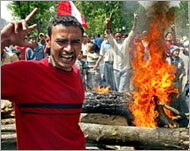Nepal moves to curb king’s power
Nepal’s parliament is set to introduce a new law restricting the king’s power and bringing the country’s army under parliamentary control, officials say.

“The seven-party alliance is making a draft proclamation to be presented in parliament that would give full autonomy to the house,” Ram Sharan Mahat, Nepal’s finance minister, said on Saturday.
Parliament was reinstated in Nepal after King Gyanendra handed back power at the end of April, following weeks of anti-royal protests across the country that left several dead.
The king had seized absolute power in February 2005 after sacking the government, accusing them of corruption.
Parliament has matched a ceasefire by Maoist rebels and said it will elect a body to redraft the 1990 constitution.
The new constitution is expected to cut royal power, a key Maoist demand.
Sweeping changes
A provisional list of 10 changes drawn up by an alliance task force is to be presented to parliament for approval, reports said.
|
|
|
Nepal was rocked by weeks of
|
Among the proposals are plans to scrap any political role for the monarch and to give the government the right to choose a successor to the throne.
Other proposals include removing the monarch’s power to choose the head of the army, taxing the monarch’s income and properties, and changing the name of the Royal Nepalese Army to the Nepal Army.
“As long as we are supported by the people we are confident that the proclamation will be endorsed by parliament,” said Mahat.
The proclamation was expected to be put before parliament on Monday, senior officials said.
Parties ousted by Gyanendra formed a loose alliance with the rebels late last year and the mass protests that saw him forced to climb down were organised by Maoists rebels and the seven-party alliance.
At least 12,500 people have been killed since the Maoists began their rebellion a decade ago.
